#read more queer stuff
Text
PSA. Queer Liberation Library
oh hey. hey you. yeah. you should sign up for this. and then you will have access to queer stuff in libby app. do it. even if you are not queer. you walk by queers everyday. they are part of your community and their art is just as good as art from straight people. do yourself a favor and read one book by a queer author this year. if you do it this month, make it a black queer author. and if you got a couple extra bucks, like if you decide to have drip coffee instead of cappuccino, maybe send those extra bucks in the direction of QLL.
thank you kindly for your consideration and enjoy some queer lit through the libby app tomorrow.
179 notes
·
View notes
Text
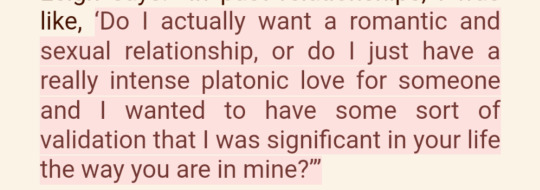
been going a little bit insane about this sentence from Ace by Angela Chen for the past week
#replace this with any other type of significant relationship too#also! this book actually rules btw i really recommend it#i didnt read it when it first cane out bc i was like. well i am already pretty familiar with asexuality and not rly interested in 101 stuff#but it turns out it doesnt feel 101-y at all its a super awesome piece of queer theory and also chen has Good opinions#and not weird watered down ones that i am sometimes wary of in aspec communities (frankly especially ace ones)#i think maybe if more people approached asexuality the way chen does (including and maybe even especially ace people)#i would be more inclined to still ID as ace#but anyways!#aro#aromantic#<- tag selections that reflect how i personally engage with this quote#also#described in alt text#also also#j tag#:/#aro media
8K notes
·
View notes
Text
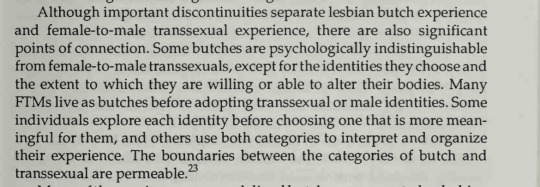
"Although important discontinuities separate lesbian butch experience and female-to-male transsexual experience, there are also significant points of connection. Some butches are psychologically indistinguishable from female-to-male transsexuals, except for the identities they choose and the extent to which they are willing or able to alter their bodies. Many FTM's live as butches before adopting transsexual or male identities. Some individuals explore each identity before choosing one that is more meaningful for them, and others use both categories to interpret and organize their experience. The boundaries between the categories of butch and transsexual are permeable."
-"Of Catamites and Kings: Reflections on butch, gender, and boundaries" by Gayle Rubin, The Persistent Desire, (Joan Nestle) (1992)
#lesbians#lesbianism#trans men#transgender#gender stuff#lgbt#lgbtq+#lgbt history#lesbian history#transgender history#transgender men#FTM#butch#history#the persistent desire#this section was so important and more young queers need to read this#and understand our communities have always overlapped#and will always overlap#the lines are blurry and barely there they arent walls
2K notes
·
View notes
Text
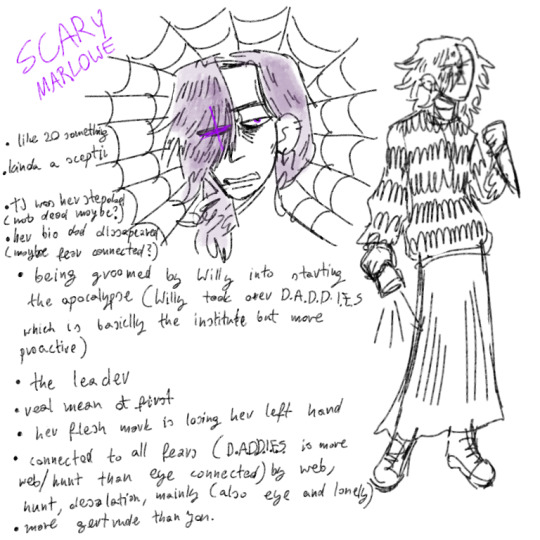
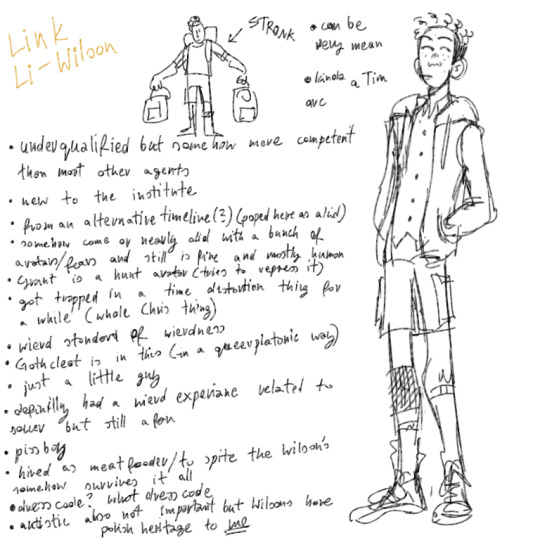

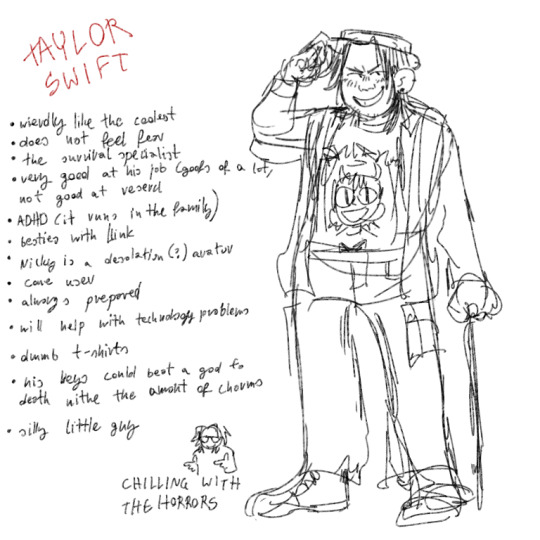

Ok this is intended with me as its target audience (as all my aus are to be honest). But I just finished tma and this has been stuck in my head for days so i gotta share it. I will elaborate extensivily if asked.
So DADDIES is basiclly the magnus istitute, and these guys are its employees (all intended as like easrly-mid 20s) tho its less archiving/researching and more stopping the monsters, after the mysterious dissapearences of the previous ceos (kiddads and previously the og dads) Willy takes over and hires Scary as the archivist (well not archivist more like investigator or something, but anyway hes trying to groom her to start the apocalypse). This institude is more web/hunt and less eye adjecent. The doodler is still a thing (tho its diffrent cause its the entities). And these guys are trying to survive, earn a living and maybe actually investigate a mystery, as shenanigans and terrors ensue.
#dndads#dungeons and daddies#normal oak#my art#link li wilson#hermie the unworthy#taylor swift dndads#scary marlowe#dndads tma au#yes i know someone else is writing a crossover fic but i wanted my own take it so here it is#you can see me lose effort with the drawings i think lol#hope my writing is easy enough to read as my adhd brain is not writing that down#oh scary is definitly trans here btw they are all queer#the horrors are plantiful but at least they are gay#is there ever gonna be more stuff i make for this au? maybe
229 notes
·
View notes
Text
Hot take but I think what we saw in chapter 13 was necessary.
I don't think a lot of people realize how important it is for Araki to portray what he did, even if it extremely difficult to take in. Let me explain.
Araki has discussed about topics like racial and class disparity through both Steel Ball Run and Jojolion, but JOJOLands is different because the discussions are now very direct. We had Chapter 1 open up with police brutality and Chapter 13 open with intense bullying; both acts were committed by people of higher social standing/power and seemingly White (or white passing) and both are harming a dark-skinned queer individual. Not only that, remember that Hawai'i is an island stolen and colonized by the US and many indigenous individuals who were supposed to live and maintain kapu are being forced to endure housing problems, loss of culture, etc. due to gentrification and exploitation of its lands. 2020 was when we saw global protest towards the deaths of George Floyd and Breonna Taylor due to police brutality, which has spread as far as Japan in terms of demonstrations and rallies. Araki has made it clear that he tries to take real world experience into his writing, and this is no different. He is also no stranger to portraying law enforcement throughout his parts without glorifying or downplaying their behavior.
As a mutual of mine (who themselves identify as a black GNC individual based in US) has put it, those who identify or even appear as Black while identifying as trans-femme or women are subjected to some of the worse kinds of oppression possible in America. Queer women of Color are one of the most susceptible to sexual violence-- especially when they are young, and the darkness of their skin really plays into it. This is transmisogynoir; it is a hard pill to swallow and acknowledge, even if it feels excessive, and its a multilayer of oppression that connects a person's racial identity, gender, and sexuality as targets of discrimination. It's the fact that one is POC, a woman, AND queer that makes one a target--- not just one or the other. You can’t turn a blind eye to this because it happen constantly throughout America's history and American society even today, but you can't simply water it down or downplay it. In fact, many victims of transmisogynoir have no choice but to downplay their experiences because of their Black identities or because they appear too dark to be taken seriously; when they, especially if they are Black, try to hold people in power accountable, these individuals are suddenly labeled aggressive, indignant, etc. and they are further discriminated for attempting to speak up. Dragona downplaying the bullying isn't them just trying to avoid further conflict but a reflection of how many who were in similar situations like Dragona are forced to simply forgive and forget the trauma they have to endure. To downplay it ourselves is reinforcing the narrative that individuals like Dragona in real life should remain silent and endure their harassment rather than rightfully protect themselves and others from it.
Another thing to add is that the way Japan portrays and treats the LGBTQ community, particularly the trans community. In Japan, the process to legally change your gender is complicated and requires a lot of steps that include, but not limited to, being diagnosed with gender identity disorder, proving you have no kids/guardianships, and sterilization. This causes a lot of individuals to be forced to quickly transition as a means of getting their gender recognized, which takes away the time to let them explore at their own pace, and this is due to how the process can lead to hindering career and life opportunities that wouldn't be hindered had they already transitioned or stayed closeted. Many Japanese trans individuals unable to go through the process quickly either remain closeted or move away from Japan to transition at their own pace. So, as a result, the trans community and its struggles is not as noticed compared to outside of Japan. Another thing to add is that the trans community in Japanese media is often portrayed as comedic relief or a gag. Oftentimes, the trans character or character who diverts from gender conformity (i.e cross-dressing, acting more flamboyant) is the butt of the jokes. Some thing to note is that, when Dragona was first introduced, a lot of people thought that Araki put Dragona in simply for comedic purposes. I had people joke about how Dragona is just there because they believed Araki is trolling. Not only that, the racial issues that Japan has often results in jokes towards non-Japanese individuals in media, especially if they are of darker skin color.
So, Araki putting Dragona in these difficult situations is also meant to subvert expectations that his Japanese, and possibly Western, audience may be expecting. The expectation was to laugh and toss Dragona aside as a single-dimensional character, but Araki instead forced us to face the trauma through Dragona's experience head-on. We are made aware of Dragona's situation, how real and difficult the struggle is, and we end up emphasizing with it rather than laughing at it. Through this, we get a glimpse into real life experiences of trans POCs without it being downplayed and have it show how Dragona is a fleshed-out character with importance to the series. As some have put it, this chapter proved that Dragona isn't just a side character but arguably a complex individual on the same level of importance as Jodio. I don't think it would have been easy to have the same impact if another approach was taken.
While talking to others who identify as trans and/or GNC about their thoughts on the chapter, I was told by many of them that, while Dragona's experience hits close to home and was hard to digest, they appreciate seeing it being expressed and hope it will help other people understand their struggles. One noted how the introduction of Smooth Operators with the backstory as empowering, seeing the Stand as a symbol of surviving the trauma that comes with trans discrimination. I do find this a bit telling with how many people online who are against Araki's portrayal barely mention what trans/GNC people have said about it.
My main concern, as well as what I see people have rightfully critiqued, is the excessive trauma reinforcing the fetishization and violent voyeurism towards trans individuals; it also reinforces the problematic narrative that dysmorphia can only happen as a result of trauma and the trans experience can only be full of pain. There's also the issue that Dragona's experience also happened while they were under age and their harassment is similar to that of Lucy. It's a common trope in Western media to put marginalized people into these situations while upping the ante simply for clicks and pleasure, and even worse when the character portrayed is a minor. As I reiterate, it is a very uncomfortable chapter to read and I don't find it enjoyable at the slightest. Just because I understand why it is necessary doesn't mean I condone the approach done. I also understand Araki as a Japanese man can only relate and portray a queer American's experience to an extent. But, at the same time, the exposure was necessary because it gives us the awareness and a voice to trans people that is lacking within media even today. We need to be aware and acknowledge what our BIPOC trans community goes through as a means of being better humans--- and especially our younger community members. We need to make our society safer for them so they can thrive and have the respect they deserve. Oftentimes, that starts with how they are portrayed and how their experiences are portrayed. While it is still a journey and not every representation will be perfect, we can't simply toss it aside and bash those who try to show something realistic just because it is uncomfortable.
I only hope that Araki wrote Dragona and these scenes as a result of doing extensive research and reaching out to actual POC queer individuals, particularly transfemmes/women, to understand their experiences and have their blessings to use their words to shape Dragona. I feel like that would show that Araki was serious about discussing these issues through his characters rather than simply using Dragona's traumatic experience it for entertainment. I have higher expectations for Araki now, knowing that it may not be the last time he shows a character experience harassment and possibly have Dragona be harassed again, so I will keep my eyes open for this.
#the jojolands#this is my first time making a long ass serious post about this so i hope my message is well put#i understand that not everyone will agree and that my view is limited due to experiences so i do apologize if my message was incorrect#i wrote this after discussing this with trans/gnc individuals about their thoughts of chapter 13 and noticed how there's discourse on it#obviously please listen to BIPOC voices especially from those who also identify as queer. many told me they appreciate chapter 13's rawness#i'm also going to use this time to read up and learn more about the trans community and BIPOC community#so feel free to send me stuff to read up on as well#but yea my two cents
67 notes
·
View notes
Text
Work has me super tired but I made a cute reading list for queer fiction (mainly surrounding my interests but you're more than welcome to use it).
Remember to take care of yourself and check the CW's for these books, especially the horror list.
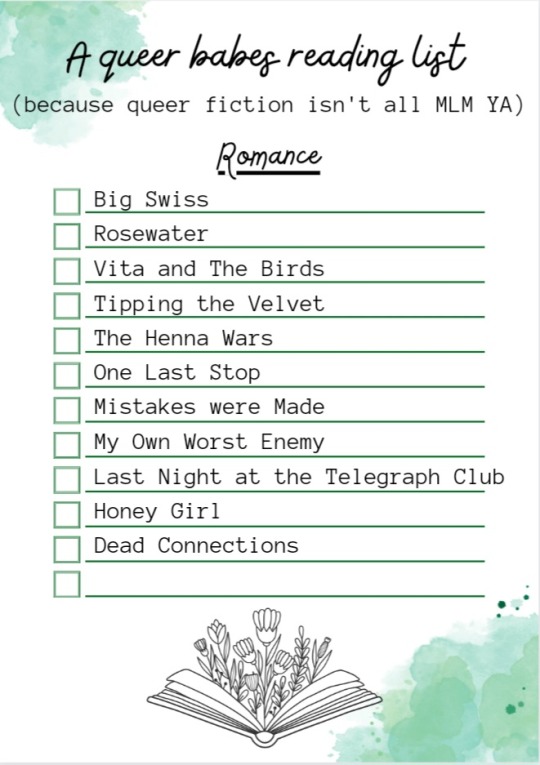
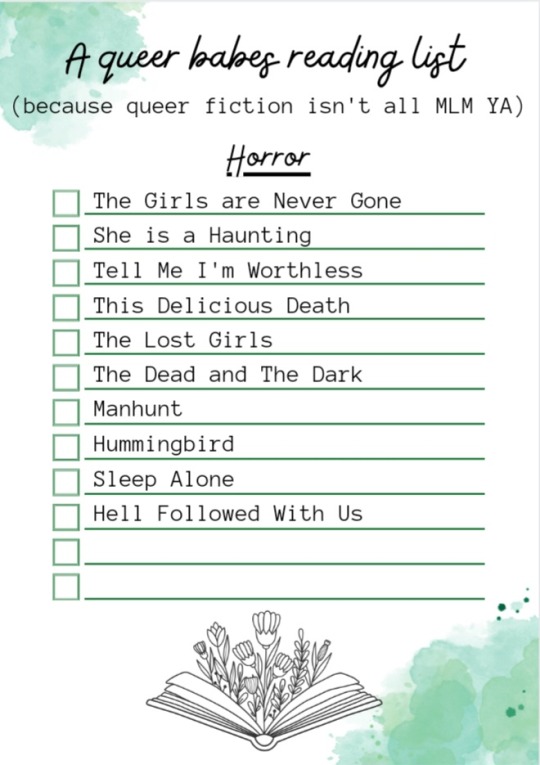
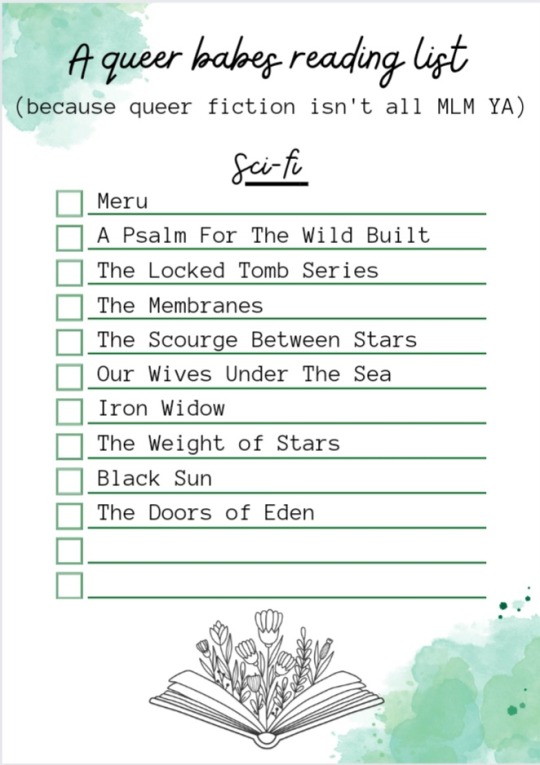
#when I started looking into more queer fiction all i was recommended was mlm ya#like song of Achillies and red white and royal blue#like that's cool but it's not for me#so i made a reading list#it's primarily lesbian/sapphic stuff#it's a mix of YA and Adult stuff#bookrec#reading list#queer reads#queer books#lesbian books#sapphic books#trans books#lgbtq books#bookblr#books and reading#lgbtq fiction#queer fiction#fiction
199 notes
·
View notes
Text
It always baffles me how much people believe that their ideas about gay sex and shipping come from nowhere when it's clearly just thinly veiled homophobic and sexist stereotypes that fem=bottom=submissive we’re all unconsciously taught growing up in homophobic societies (with racist undertones anytime half of a ship is not white). i believe it to be unconcsious bias, im not blaming people for not having unpacked why they jump to headcanon the character performing the most traditional masculinity to be a top, but it’s getting tiring. Especially when authors refuse to question themselves when getting callled out for fetichizing, say, latino men and reducing them to sex-obsessed, domineering, possessive, bordeline abusive partners. I promise you your tendency to make the more traditionally masculine one a top with a dominant attitude does not come from yourself entirely. It’s not something you just “happen” to consistently repeat your work for no subjacent reason. You have every right to hold these headcanons, and to like exploring these dynamics, i sometimes even agree with those interpretations myself ! But we all should be careful and conscious of the why, what pushed us to hold these headcanons, and check it’s not rooted in shallow gendered and racialized stereotypes.
Anyways

#this sadly applies to so many fandoms. but it’s so prevalent in Star Wars shipping communities#sam posts stuff#begging y’all to talk to actual gay men and learn about queer femininity and how detached from submissiveness it can be#if I have to read one more fic that treats the fact the feminine half of a ship is the bottom as obvious I’m throwing myself off a cliff#fuck it#dinluke#that is also rife in xreader writing communities but im not tagging that
652 notes
·
View notes
Text
hey guys am i allowed to say on main that i dont like metadad . am i gonna get beaten up for saying this.
guys i think we all took the term found family too literally and now everythings flattened into a boring nuclear family. guys can we stop. hello . is anybody there
#text#it was kinda charming at first but it feels like everytime i try to look at the mk tag its always the same shit . guys. guys.#we can do so much more w/ their dynamics than just dad and son ugh its so . ughhh.#every since i realized i was like . really really aroace. ive started to grow a bit of a distaste for shipping culture#this is relavant i swear. iwanna talk about metadede#like ok in fandoms right. theres often#the enforcement of specific roles onto characters for a simplified understanding of them for memes and drawing ideas#we want gay rep but we dont quite have it canonically so we make our queer headcanons seem more legit#by giving a char a same sex partner. ok easy we did it. gay people are real now#and we get awesome art and its wonderful bc people are wonderful#but its like . the relationships themselves feel flat a lot of the times.#metadede never seems to be about dedede. its about mk having a boyfriend. bc we need him to date someone.#and im not like . mad at anyone about this. i participated in it back in the day. but like.#ok so. gay hcs are the most popular in most fandom things bc its easy; hot; and sweet#but things like aro or ace hcs? its just. they. how can you depict that in a single framed drawing of a char?so theres none at all.#its not even that i actively hc chars aroace its jsut this is my world view; how i default to reading chars#maybe this rant in the tags is unrelated after all.#but idk. ive got lots of thoughts about things.#anyways as ceo of meta knigth im right about everything#i can talk more about metadad stuff specifically if people want
140 notes
·
View notes
Text
Yeah, so A League of Their Own continues to live in my head rent free, and lately I’ve been really fascinated with what the show does with Sergeant Beverly. There’s one scene in particular in episode 7 which really strikes me as a moment that does some really great, subtle work towards helping us understand the ways in which she fits in the show’s larger goal of exploring queer and marginalized communities.
It’s right after Jo is escorted into the house by the police, the moment Beverly asks to speak to Carson privately. I feel like this is the scene where we get our first solid hint at the fact that Bev is queer, because she speaks as if she knows. Bev knows how this works. She understands that the names will be in the paper unless someone gets paid, and she clearly knows how to go about paying the right person. She understands the danger of keeping Jo in Rockford in a way that doesn’t even seem to occur to Carson until Bev explains it. Bev discourages trades all season in an attempt to keep the team together, but she pushes this trade through overnight, because she knows that getting Jo out of town ASAP is the best way to keep her safe. Bev is very matter of fact about the whole thing, like she knows these facts of queer life, and has known them for a long time.
This scene also takes place in the same archway where Bev all but comes out to Jess, an interesting parallel which suggests that Bev often exists in a sort of in-between space. On one side of the doorway, we have the kitchen, a more private personal space. It’s the only place inside the house where we see Greta try to kiss Carson, where Carson asks Greta on a date, and Greta asks Carson to move to New York with her. It’s also where Bev shares the most she ever has about her service in the Marines as she has a heart to heart with Carson about learning to stand up for herself and find her power (even if that advice is a bit misguided). The kitchen is very clearly a private space, though one vulnerable to intrusion, as we see right after Greta asks Carson to come to New York, and where we can still see people milling around behind Bev and Jess. On the other side of the archway is the much more public space of the staircase and main entrance, the place where Jo is very publicly escorted in by police, as if to indicate that this is what can happen when a person’s private queer life becomes part of a public space.
This is the in-between Bev works within for the entire time she is with the Peaches. On one hand, she’s an employee of the league, tasked with enforcing rules and maintaining their image for the public. On the other hand, she’s a queer woman doing her very best to protect these vulnerable women. Standing in that doorway as she has these conversations is symbolic of her straddling that line between her public and private self, brief moments where we can very clearly see one bleed into the other. One of the main difference in the shots is that she stands on the left as she talks to Carson, and the right as she talks to Jess. My theory is that this is symbolic of the fact that, in one case, she is taking something away from the team, even if it’s in Jo’s best interests, and in the other, she’s giving something back. It’s a literal give and take that Bev constantly has to balance as she tries to take care of her girls.
Bev may not be a main character, but this character arc acts as an important part of this broader portrait of the lives of queer and marginalized characters living out their own unique, often untold stories. Bev often hovers in the background, but the show treats her with thought and care,using small, subtle moments to create an interesting character, someone we grow to love and remember. By the end of the season, we learn that she’s an older, closeted, queer female Marine who doesn’t care about baseball, but is as devoted to protecting her baseball girls as she is to her fellow Marines, maybe even moreso. I can’t think of an occasion where I’ve ever seen a character quite like that, particularly one where we’re given the time to learn about her organically. I just really love that the show puts in the time and effort to allow a character like that to be seen and included as part of this larger portrait of the lives of marginalized people in 1940’s America. A League of Their Own is just so thoughtful and sneaky smart in how it does that, and I’m so grateful that it exists in this world.
#aloto#a league of their own#sergeant beverly#queer representation#meta#seriously though#the more I engage with this show the more I realize#how smart and thoughtful and well-researched it is#I forgot how much Ilove reading and writing meta#and I love this show so much for reminding me#(among other things)#this show has me in an absolute chokehold in the best possible way#my stuff
612 notes
·
View notes
Note
With that Queer Sam poll going around, have you ever made any posts about Sam and queerness? I saw some takes in the notes about how he's queer coded (leaving home and demon blood) and I was curious if you ever got queer coded vibes from those moments?
I'll be real I never get queer anything from Sam. This might have more to do with (to me) Jared having no romantic chemistry with men. Like sorry to those who dabble but I am not capable of watching Jared interact with a man and reading anything but platonic or familial connection... with one exception which is a two minute exchange with Paul the bartender.
I've never really gotten the "demon blood as a metaphor for queerness" thing tbh. Like "I'm different therefore I'm queer" doesn't really work for me when it's like "I'm different from everybody else because my mom made a demon deal and as a result a yellow eyed demon dripped blood in my mouth once when I was a baby and is using it to give me psychic powers for two seasons and then it goes away until I choose to drink demon blood from my hot demon girlfriend to get revenge on the demon who killed my brother" is not a plotline that screams "I'm gay" to me.
I'm assuming there's more context to the leaving home bit because going to college at 18 even though your dad wants you stay and work in the family business is not a queer storyline to me it's the story of millions of kids in America. The unique element is what their family does for a living.
#mail#i haven't read a lot of queer sam stuff i'll be real maybe there's more to it than i'm aware of but in terms of my own viewing experience#i got nothin'
44 notes
·
View notes
Text
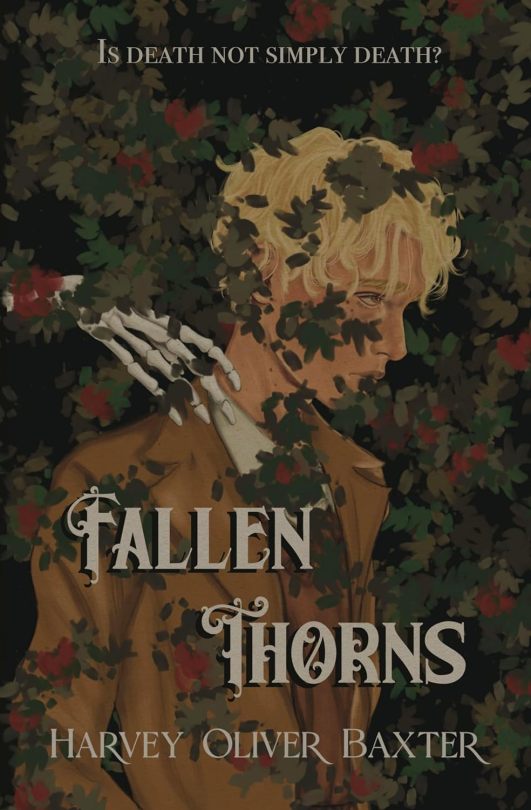
2024 reads / storygraph
Fallen Thorns
dark urban fantasy coming-of-age
follows a boy settling into university, when after a date (that he didn’t even want to go on) turns bad he’s made into a vampire
as he settles into his new existence and the local vampire community - while they try to find who’s been leaving bodies across the city - he discovers that there’s something different and darker within him
aroace neurodivergent MC
#fallen thorns#aroaessidhe 2024 reads#I enjoyed this a lot!#there's definitely things I want to know more about...I think it's going to be a series? the only thing explicitly mentioned is a prequel#the ending is a bit weird and I don't entirely get the sun/star/moon stuff dfhgd#really great characters and atmosphere#great aroace MC in general tho minor pet peeve from me:#it does have that thing where the character spends half the book ruminating about how there’s something wrong with them bc they don't feel#things everyone else does etc etc and it’s like omg all these queer people and nobody’s heard about asexuality???#then he’s having a conversation with someone later in the book and he’s like yeah I know about asexual but I didn’t think about that re: me#and the other char is like: what if…..it IS you…..and he’s like omg. i AM asexual there’s nothing wrong with me after all! (in like. a page#like I’ve read this in multiple books LMAO. I do get that you can know about an identity and not connect it to your experiences#but somehow the writing of it like this is never quite believable? too sudden? then it's not thought about much after that?#anyway that's not a critique of the ''representation'' as much as just the writing I think - there's a few areas where I thought the writin#could be improved structurally or whatever. Didn't massively impede my enjoyment.#(I do also love an aroace mentor/parent figure!)#aromantic#aroace books#aromantic books
41 notes
·
View notes
Text
that post that's like "learning social skills helps with social anxiety" applies to dating also btw
#i guess they have a circular relationship because also going on lots of first dates was really trial by fire for me in learning lots lf#new social skills#meeting new people was never my strong suit and i was very afraid of it and would avoid it but like!#when i first tried going on first dates i learned a lot about how to meet people and met types of queer people i'd never met before#and actually it was good for me even though it was often weird and stressful#and it was a lower-stakes way to practice social skills that i otherwise would've just avoided using until they atrophied#anyway whenever i see a dating profile that's like 'i'm afraid of talking to women lol' i'm like ok relatable but what's your plan to learn#i think also just like it doesn't have to be through dating but it is good for you to meet other gay and trans people offline if possible#when i moved to wisconsin i only knew my coworkers who were mostly also twentysomethings who'd been hired straight from college#and it was good for me to meet and make friends with other local gay and trans people who were involved in different stuff#idk i just don't know how many more 'i'm obsessed with romance but scoff at the idea that i should do anything about that' posts i can read#like if i said i wanted to run a marathon but i never practiced running people would fairly be like okay that's prob not gonna happen#idk i know it's no skin off my nose i'm just like. if you never take any steps towards expressing your desires#how do you think they're going to just happen to you#personal nonsense
58 notes
·
View notes
Text
something about asexuality that is underappreciated is its potential to recontextualise -- this is true of queer reads + disabled reads generally, but asexuality is very much still widely in a space considered unworthy of looking at closer, because for many people it simply represents “not doing anything.”
this also embedded in irl acephobic wank that claims it’s “not as queer” as other kinds of queerness, because again, all that is perceived is a surface-level idea that as it is apparently just “not having sex,” that must mean it is at odds with liberatory queer sexual theory/practice
and so what does this apparent “not doing anything” have to say about our fictional reads? what does it say about desires for closeness, lack of language or gain of language, what does it say about characters who have never had sex, or about characters who have? what does it say about (lack of) agency and consent? about desire? how does it play into bdsm and kink? into concepts of sexiness and attractiveness (both wanting or not wanting to be perceived as such and perceiving or not perceiving of others as such)? into bodies and our relationships with them? how does it recontexualise characters goals or lack of goals for life? how does it put them at odds with social expectations for them in the times/stories they exist in?
and once one starts asking actual curious questions, one can easily see that a character being read as -- or, hell being, if we’re so lucky -- asexual, is potentially doing a heck of a lot!
#i focused on asexuality here instead of asexuality and aromanticism#because I was particularly thinking about sex/versions of sex#which is a little more specific + i think there is something a little different id wanna write about aromanticism#its invisibility is more encompassing/slightly different/the antagonism against it has similarities but also differences#asexuality#queer stuff#queer reads#queer fiction#ace stuff
152 notes
·
View notes
Note
Ty for answering my q! (Am the guy who asked about lgbt being common in ancient china etc) since lgbt is more of a western concept what would be a chinese equivalent for it? Like how is the chinese homosexuality different from the west? (Sorry if my wording is off im not exactly sure how else to phrase it 😭😭)
I'm just talking about the cultural differences that shape what it means to be queer across the globe. Modern LGBT+ discourse was led and shaped by western academics so theories of gender and sexuality are based largely on the that of white thinkers. Although it's true that English LGBT terminology and the relevant standardised definitions have spread and been translated globally, and that Western ideals of masculinity and femininity remain dominant overall, similar concepts can't be understood 1:1 across all cultures. And there certainly existed something else before Western influence.
Also, picture this: you are watching a TV show from the Song Dynasty. You notice some of the male characters are always wearing flowers on their head/in their headwear 👀. You, proficient in imagery and symbolism, think to yourself, "💅🏼?"
But little did you know that this was a men's fashion trend at the time, practiced by young and old, rich and poor, hardly the indicator of queerness!
What I mean is, when it comes to looking at history, especially history of different cultures, basically you have to remember that there is a different context/historical framework to what is queer, what is gendered masculine and feminine, what is homoerotic/sapphic (and "queerplatonic" as we'd understand some of these instances and relationships), what is sexual, etc. So going back to my comment in the previous ask, based on all this, I personally feel that bringing terms like LGBT to such conversations is not appropriate because it also brings with it a modern framework which is not productive to understanding history as having its own frame of references.
If that makes any goddamn sense lmao.
#tldr i was being a pretentious and philosophical about the wording of your question#text#answered ask#but it's just like true in general that western views lead discussion on a lot of lgbt stuff#most people dont really realise it#but it really shows its ass when it comes to the intersection of gender expression and lgbt/queer theory readings of east asian figures#e.g characters not even pushing any literally not one gender binary norm within their contexts (e.g wuxia or period drama)#but getting queer theoried via perceived gender expression#or whatever you know. that thing that happens to idols#keeping this in the tags because i suspect it's irrelevant and i just wanted to be salty#every time i start thinking for more than 5 minutes i forget what the question was#also there will probably not be any videos tomorrow bc despite my yammering i have actually been busy this week#gay ask#look at me already forgetting new tags
264 notes
·
View notes
Text
after rereading dark rise i am now pondering the similarities between james immediately being cast out by the stewards when they realized he was a reborn despite the fact that he had no control over who his past self was versus strict religious communities that believe being gay is a sin and someone is inherently bad because of their sexuality even though they're just born that way and it's a normal part of a person
#i feel like this is on purpose???#at least cs pacat has stated dark rise is about adding queerness into the traditional hero's narrative#and questioning ideas of good and evil in those stories#pie says stuff#pie reads#dark rise#cs pacat#books#actually i would like to know a bit more about the steward's thoughts on sexuality#they seem chill with people of various genders and races being stewards#but then james's dad called him a kind of bad historical term for gay people??#that may have been about specifically having been the dark king's lover tho
26 notes
·
View notes
Text
liking romantasy as an ace person who is more sex-indifferent than sex-favorable is so exhausting. there are all these books that look cool but the authors mostly market them based on spicy levels and spicy scenes and it does nothing for me so i just sit here like :| thats nice i guess haha
#nothing wrong with spicy levels btw#but spicy is like a plus for me#i only really enjoy it if i like the romance first so all the marketing is lost on me#which is why i think fantasy romance wip has no target audience at all LOL WHO IS THIS FOR EXCEPT ME SPECIFICALLY#its such a specific niche like#if you like romantasy but queer#and queer as in transmac & nonbinary ppl mostly with ace/aro characters#might have spicy stuff but not much and not for a long time#huge platonic element but the romance is There (I SWEAR)#who wants to read this even#again: this is not a condemnation of romantasy its more a 'i want to read this and there isnt much of it and that makes me sad' thing#ren.txt#i feel like im stuck between regular adult fantasy which is usually very dry and emotionless with no well written relationship to speak of#(romantic or otherwise)#and romantasy which has the emotion i want bUT GOES ABOUT IT IN A WAY I CANT RELATE#*shakes fantasy genres* IF YOU COULD JUST MEET IN THE MIDDLE
27 notes
·
View notes